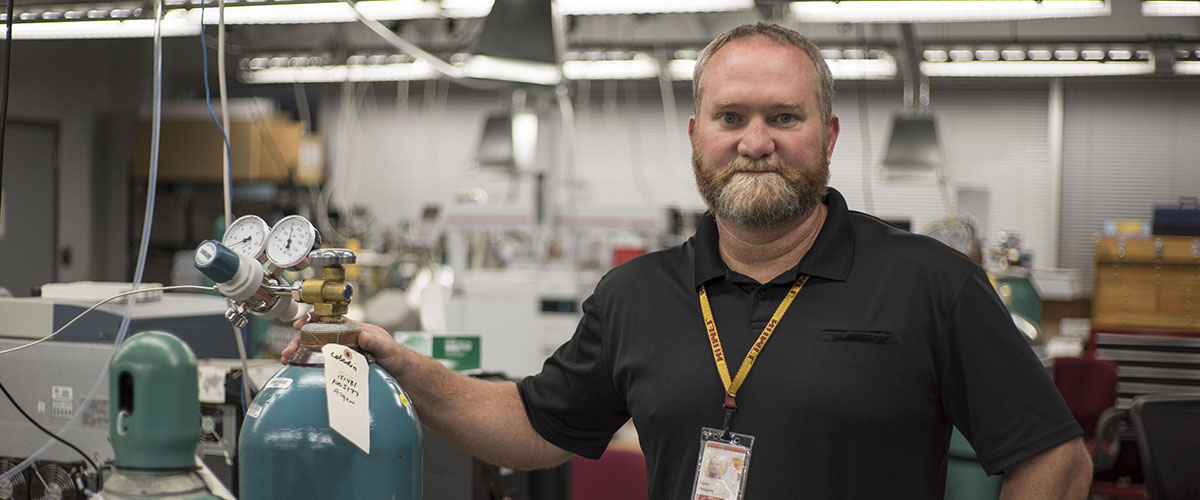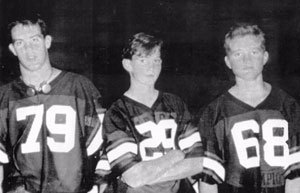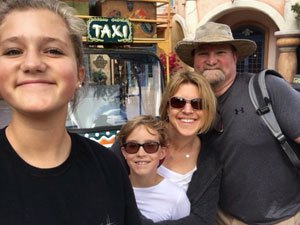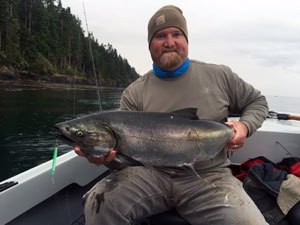
With determination, confidence and a top-notch team, this MagLab chemist exposed the complex secrets of crude oil, busting open a vast, new field.
Ryan Rodgers is someone you'd want on your side — partly because you wouldn't want to face him on someone else's team.
A chemist at the National High Magnetic Field Laboratory's Ion Cyclotron Resonance (ICR) Facility, Rodgers makes an intimidating opponent. If the game is mental, beware: You're facing off against a whip-smart guy who, at 45, already has a string of American Chemical Society awards topping his resume. He boasts a freakish perspicacity, say colleagues, who have watched him sift swiftly through haystacks of data to pinpoint the juicy bits, like a hawk spying a mole in a meadow. If you doubt him, be prepared for a deft riposte.
If that doesn't daunt you, Rodgers's physical presence probably will. Dense and squarely built, it's easy to see the ex-football player in him. His default expression reads like a scowl, discouraging idle chitchat. Piercing blue eyes and a graying beard lend him the air of a predator you don't want to turn your back on.
Lucky it is, then, that Rodgers landed on the teams of the National MagLab and Florida State University (FSU) — one of the good guys. As director of petroleum applications and the Future Fuels Institute at the lab, he leads the effort to develop the world's best tools and techniques for learning more about oil, its chemistry, its uses and its effects on the environment, a field known as petroleomics.
"He's been at the tip of the spear, has forged all the relationships that we have with other stakeholders — the petroleum industry, other academics who do this work," said ICR Facility Director Chris Hendrickson. "That's all been something that he has built up." This month FSU recognized those far-reaching contributions, decades in the making, with a Distinguished University Scholar Award.
Rodgers' small office at the MagLab looks like the "after" photo from a tidal surge. The floor is littered with boxes, papers and journals, his desk strewn with empty soda cans, calipers, travel documents, family photos, crumpled paper towels. But like the nuggets he spots in cluttered data, he can quickly retrieve from this mess the information he needs at any given moment. And that is Rodgers in a nutshell, those who know him say: A guy, grounded in reality, who can discern a road ahead through a fog of details, and who can guide his team there with certainty and confidence and calm.
Rodgers was born into a team. The middle of three sons growing up in the Florida Panhandle near Eglin Air Force Base, he and his brothers were routinely pressed into service by their electrical engineer dad for yard work and repairs around the house. One of his earliest memories is helping replace a rusted-out threshold in the garage, the pungent smell of Ospho rust treatment thick in the air.

Ryan Rodgers (far right) with long-time buddies Joe Harasimowicz (left) and Mike Bruner during junior high school.
Adopting the DIY creed of their military community, the boys tackled broken washers, dryers, radios, fridges, truck brakes, alternators, water pumps, lawn mowers. Sometimes they tore a machine apart, diagnosed and addressed the issue, then put it all back together. Sometimes they had to design a new tool to fix the problem, then cobble it together from scratch. In both scenarios, they were encouraged to keep at it until the job was done.
"I didn't know what a repairman was growing up," Rodgers said, whose self-assurance grew with every broken thing set right. "There was no repairman. We were the repairmen."
Rodgers found a second band of brothers in a tight-knit group of pals. Thick as thieves, they spent endless hours exploring the grass flats, beaches, bays and backwaters around Fort Walton Beach and Destin. They camped, explored, snorkeled, rode bikes, and did a lot of stupid things. Mostly, they fished. From piers, kayaks, canoes, someone's dad's 28-foot Pro-Line. Trout, red fish, flounder, tarpon, king mackerel, cobia, Spanish and pompano.
Each adventure was a lesson in logistics, responsibility and collaboration: How are we going to get there? What will we eat? How do we prepare for the weather? What supplies do we need?
"Mostly you just learn that you're in control of your fate," Rodgers recalled. "Whatever you're doing that day, you need to plan how you're going to do it."
The boys also just hung out, hours at a stretch at their secret spot overlooking the Choctawhatchee Bay. They talked girls, school, cars, sports, the future, forging bonds that have held fast for decades.
"He's very dependable," said Mike Bruner, who met Rodgers during a game of pickle on the Shalimar Elementary playground. "He's always willing to help you. If you call Ryan and have a problem or need something, he'll ask, 'What do you need and when do you need it?'"
During all those years under the North Florida sun, another kind of bond was forged, between the boys and the natural world that was their stomping grounds.
"I think it just gives you the big picture,” said Rodgers. “You understand how tides affect fishing, how weather affects fishing. I guess you learn how to understand a very complex system, and try to understand it in a way that will maximize your chances of getting what you want."
Rodgers also gravitated to teamwork on the field, playing on his high school squads for baseball, soccer, wrestling and football, where he excelled as a deep snapper. As smart as he was athletic, he headed to the University of Florida on an academic scholarship after graduation. But when the football coach, by pure chance, got wind of his talents, he recruited Rodgers to join his lineup in the spring of his freshman year. Living out a boyhood dream, Rodgers played in the Gators' intrasquad scrimmage that semester. He then returned home for the summer to earn money, hang with his buddies, and anticipate his first full season as a Gator and the full athletic scholarship that went with it.
Rodgers' lucky break was followed, within just a few months, by an exceedingly bad one. As he drove home one night after waiting tables at a seafood place, an illegally parked car pulled out suddenly in front his Mustang Ghia. Rodgers swerved to avoid it, only to skid on the rain-slicked road right into oncoming traffic.
Decades later, Rodgers recalled the near-fatal collision tersely, as a sound effect.
"Sshht! Pow!" he said. "Football was done."
So was school, at least for another year. Instead, there were two facial reconstructions, three nasal reconstructions, surgery for a knee impaled by a gear shifter that efficiently tore every ligament in its path. There was a massive infection and months spent slurping sustenance through a wired-shut jaw. Barely living off Gatorade, chicken broth and Mountain Dew, Rodgers shed a third of his body weight. To this day, straws are anathema to him.
Months after the accident, Rodgers surveyed the remains of his ride at the junkyard, tufts of his auburn hair still embedded in its fractured windows. A picture of how quickly dreams can be shattered.
But a resilient nature, cultivated through a childhood of problem solving, kicked into gear.
"Over the longer period, you have to learn how to overcome things," Rodgers said. "Or else you're not going to make it."
Mike Bruner still marvels over the grit his friend showed through the years-long ordeal.
"He never really complained or seemed to feel sorry for himself," Bruner said. "Something bad happened to him, but he just kept going."
Rodgers just kept going. A year later, after the worst of his recovery, he returned to UF. He left his frat house and got more serious about classes, focusing on the chemistry of petroleum. After graduation, he landed at FSU for graduate school under the mentorship of Alan Marshall, a highly regarded chemist who was building up a facility at the National MagLab for Fourier-transform ion cyclotron resonance (FT-ICR), a technology Marshall himself co-invented.
A mass spectrometry technique used for analyzing complex mixtures, FT-ICR is like a very fancy scale for molecules. In a nutshell, it works like this: Scientists first ionize (or give a positive or negative charge to) the substance they are studying, so that the molecules will interact with a magnetic field. Then they send it into a superconducting magnet that identifies each molecule by detecting its unique mass. This enables them to precisely decipher the substance's molecular makeup.
In 1995, when Rodgers joined Marshall's team, FT-ICR was still relatively young, the instruments still relatively weak. Although they had been used successfully to characterize a number of substances, they had been only recently deployed on petroleum, and at low magnetic strength. Many scientists felt it couldn't be done. Crude oil, comprising tens of thousands of different kinds of molecules, is the most chemically complex substance the Earth has ever cooked up.
Finding a way to make ICR work on oil would require solving a long string of interconnected problems. These included building a machine more or less from scratch, designing and machining the parts, figuring out the science, acquiring samples to study from wary oil companies protective of trade secrets, developing sample preparation and ionization techniques, trouble-shooting instrumentation. Anyone who took on the task would face years of tedious work, quite possibly with little to show for it by the end.
But if the obstacles were big, so was the potential payoff. A better understanding of petroleum could solve a lot of multimillion-dollar problems. The more chemistry oil companies understood, the better decisions they could make about whether a certain reserve was worth exploiting; or how to separate water from extracted oil; or how to treat their black gold so it wouldn't clog or corrode equipment and pipes.
Marshall thought it was worth a shot, and Rodgers was up for the challenge. The senior scientist introduced his new student to his starter kit: a hand-me-down 5.6 tesla magnet.
"There's your magnet,” Marshall told him, as Rodgers remembers it. "Make it happen."
A herculean task requires a crackerjack team, and at the MagLab, Rodgers had all the right ingredients: research engineer John Quinn, machinist Danny McIntosh, senior grad students Forest White (now a professor at MIT's Department of Biological Engineering) and Jarrod Marto (now at Dana-Farber Cancer Institute), as well as postdocs Chris Hendrickson (now director of ICR at the MagLab) and Michael Senko (now at Thermo Fisher Scientific).
Like a good team captain, Rodgers drew on everyone else's expertise while keeping his eyes on the big picture.
"That means really needing to understand other people's needs and learn to speak their language well enough to work effectively with them," Quinn said. "And that means … being able to understand somebody else's science, somebody else's technology.”
But even the best teams can't solve an unsolvable problem, and many thought Rodgers was wasting his time. He ran into a lot of roadblocks, struggled to optimize the machine, then to get any relevant data out of it. He published a few papers that were largely ignored.

Ryan Rodgers (with wife, Erin, and their daughters) tackles problems large and small at home and in the lab.
But where others see hurdles, Rodgers sees a job to be done, broken down into logical steps. Like when his wife, Erin, falls in love with a piece of furniture during a road trip, which Mike Bruner has witnessed more than once. Bruner's reaction would be: It can't be done. Or: It's not practical. Rodgers, on the other hand, snaps into action, locates the U-Haul place, rents the trailer, drives it to the store, loads the furniture, schlepps it home.
"Ryan figures out where he is and where he needs to go, figures out the steps to get there and comes up with a logical plan to do it," said Bruner. "And he stays cool under pressure."
Hendrickson has watched Rodgers slay doubters like so many dragons, wielding logic, confidence, and insight in lieu of lances.
"If things aren't working out, he doesn't give up," Hendrickson said. "He says, 'Well, we need to try something a little different. Let's go this way, let's go that way. Let's try something new. We're going to solve the problem.'"
Gradually, over the course of five years, Rodgers became the world's expert in studying petroleum using FT-ICR. He and his team made it work, founding the field of petroleomics and firmly establishing the MagLab and FSU at its helm. With FSU's backing, he helped created the MagLab-based Future Fuels Institute, which provided a framework for collaborating with oil companies on proprietary research.
"All of a sudden it became something that we were the only ones who could do," Hendrickson said. "And everybody wanted it."
"Everybody" included oil titans like ExxonMobil, Shell, Total and Saudi Aramco, which saw in petroleomics dollar signs followed by lots of digits; academics eager to come use the lab's new tools to explore the brand new field they had just busted open; companies that do chemistry for the oil giants, such as Nalco Champion, an EcoLab Company.
From an economic standpoint, the impact of the nascent field would prove huge.

Ryan Rodgers (fishing for king salmon in Washington state) has a deep connection to the environment he studies.
Coming up with an exact figure is tricky, said Andrew Yen, a chemist at Nalco Champion and long-time collaborator with Rodgers. Research that oil companies pay to do at the MagLab is proprietary, and they're vigilant about protecting trade secrets. But for a rough idea of what that research means to a company's bottom line, Yen said, consider that just one platform that benefited from the MagLab's expertise churned out some 200,000 barrels a day at peak production. With oil going for $100 a barrel at that time, even a small impact would have quickly generated millions in savings.
"Definitely it's a huge economic impact," said Yen. "It's not easy to quantify, but it's a lot."
The impact on science has been huge, too. The MagLab's program has trained hundreds of grad students, postdocs and visiting scientists, then sent them out into the world to further the field. Dozens of universities and companies have acquired their own FT-ICR instruments to pursue in-house research. Scientists have written thousands of publications about all aspects of petroleomics, each one expanding our understanding a little bit more.
Rodgers has co-authored many of those publications. Some he's particularly proud of, including a series of five papers that demonstrated that a model of petroleum composition known as the Boduszynski model, which had fallen into disfavor among many chemists, was in fact valid. He is currently collaborating on a second series of papers challenging the current dominant model for understanding molecular structure.
Perhaps most importantly, that body of knowledge has a huge impact in the environment: coastlines, fracking fields, river basins. By understanding the molecular composition and structure of complex systems, Rodgers explained, scientists can better predict outcomes. In the event of an oil spill, for example, what happens to the molecules? Where will they end up? How they will transform? Will they become more or less toxic?
These are critical questions to Rodgers, whose life and livelihood were shaped by years exploring the Gulf Coast. He often returns to those ecosystems to visit friends and family, to teach his daughters about fishing and the interconnected web of flora, fauna, weather, tides. The tools and science he pioneered play an important role in protecting these communities, probing environmental problems related to fracking, oil spills, and how all these molecules change once released into the environment.
When it comes to protecting nature, Rodgers said, "If I can help in any way, it's a no-brainer."
Because Rodgers often works with oil industry scientists who like to keep a lid on sensitive details, many of his findings never see the light of publication. Some papers get stripped of the juicy bits, and with them the visibility the articles would otherwise merit. But Rodgers adeptly walks that tightrope between academia and the corporate world. He negotiates for key science points to stay in papers; he flies around the globe to collect samples and hear the problems companies face as their sweet crude reserves run out and they have to drill for heavier, more complex, harder-to-refine crude oils.
Like a good teammate, Rodgers listens to their issues. Like a good repairman, he hunkers down with his team to fix them. And that's more satisfying, he said, than publishing in the top-ranked journals.
"In all of the FFI work, we've never gotten a problem that we didn't essentially solve. So that's success for me," Rodgers said. "We're getting a track record of being able to deliver. If there's a problem, I want people to think, 'Well, you have to call the MagLab.'"
By Kristen Coyne
Find out more about petroleomics and Rodgers' research by reading the below papers or viewing all his publications on his personnel page.
Maltene and Asphaltene Contributions to the Formation of Water-Soluble Emerging Contaminants from Photooxidation of Paving Materials, Glattke, T.; Chacon Patino, M.L.; Marshall, A.G.; Rodgers, R.P., Energy&Fuels (2022)
Molecular Characterization of Remnant Polarizable Asphaltene Fractions Upon Bitumen Upgrading and Possible Implications in Petroleum Viscosity, Chacon Patino, M.L.; Heshka, N.; Alvarez-Majmutov, A.; Hendrickson, C.L.; Rodgers, R.P., Energy&Fuels,36 (14), 7542-7557 (2022)
Advances in Asphaltene Petroleomics. Part 1: Asphaltenes Are Composed of Abundant Island and Archipelago Structural Motifs
Chacon-Patino, Martha L.; Rowland, Steven M.; Rodgers, Ryan P.
Energy & Fuels (2017), 31(12), 13509-13518.
Fractionation of Interfacial Material Reveals a Continuum of Acidic Species That Contribute to Stable Emulsion Formation
Clingenpeel, Amy C.; Rowland, Steven M.; Corilo, Yuri E.; Zito, Phoebe; Rodgers, Ryan P.
Energy & Fuels (2017), 31(6), 5933-5939.
Novel Method To Isolate Interfacial Material
Jarvis, Jacqueline M.; Robbins, Winston K.; Corilo, Yuri E.; Rodgers, Ryan P.
Energy & Fuels (2015), 29(11), 7058-7064.
Solid-Phase Extraction Fractionation To Extend the Characterization of Naphthenic Acids in Crude Oil by Electrospray Ionization Fourier Transform Ion Cyclotron Resonance Mass Spectrometry
Rowland, Steven M.; Robbins, Winston K.; Corilo, Yuri E.; Marshall, Alan G.; Rodgers, Ryan P.
Energy & Fuels (2014), 28(8), 5043-5048.
Targeted Petroleomics: Analytical Investigation of Macondo Well Oil Oxidation Products from Pensacola Beach
Brian M. Ruddy, Markus Huettel, Joel E. Kostka, Vladislav V. Lobodin, Benjamin J. Bythell, Amy M. McKenna, Christoph Aeppli, Christopher M. Reddy, Robert K. Nelson, Alan G. Marshall, and Ryan P. Rodgers
Heavy Petroleum Composition. 5. Compositional and Structural Continuum of Petroleum Revealed
Podgorski, David C.; Corilo, Yuri E.; Nyadong, Leonard; Lobodin, Vladislav V.; Bythell, Benjamin J.; Robbins, Winston K.; McKenna, Amy M.; Marshall, Alan G.; Rodgers, Ryan P.
Energy & Fuels (2013), 27(3), 1268-1276.
Petroleomics: chemistry of the underworld
Marshall, Alan G.; Rodgers, Ryan P.
Proceedings of the National Academy of Sciences of the United States of America (2008), 105(47), 18090-18095.
Efficacy of Bacterial Bioremediation: Demonstration of Complete Incorporation of Hydrocarbons into Membrane Phospholipids from Rhodococcus Hydrocarbon Degrading Bacteria by Electrospray Ionization Fourier Transform Ion Cyclotron Resonance Mass Spectrometry
Rodgers, Ryan P.; Blumer, Erin N.; Emmett, Mark R.; Marshall, Alan G.
Environmental Science and Technology (2000), 34(3), 535-540.
Last modified on 29 December 2022